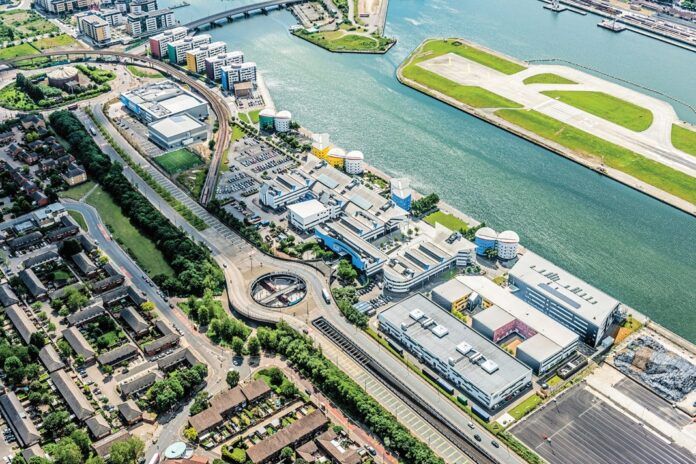
Siemens is set to design and install a Water Source Heat Pump (WSHP) at the University of East London (UEL)’s net zero campus.
The new WSHP will power the university’s Docklands Campus Library and Royal Docks Centre for Sustainability buildings, replacing existing gas boilers.
According to a statement, the closed-loop system is submerged in the River Thames and will use a series of pipes to extract natural heat from the water in the Royal Albert Docks. This will provide a heating system which will reduce annual CO2 emissions by 258 tonnes without removing vast quantities of water from the river, it noted.
The system is scalable to allow the university to extend in the future similar heat pump systems across the Campus and the wider Royal Docks. It is part of the long-term partnership with Siemens, which is supporting the university’s transition to net zero by 2030.
The strategic partnership, which was formed in 2022, has seen Siemens deploy a variety of decarbonisation technologies including solar PV, Building Management Systems and EV charging infrastructure across the university campus. In addition, Siemens said it is using its Building X technologies and data analytics to allow UEL to better understand its energy consumption and drive research and enterprise programmes.
A statement said that the partnership is saving the university over £500,000 per year in utility costs and reducing emissions by over 1,000 tonnes annually.
This project directly supports the Mayor of London’s vision for a more sustainable capital, advancing his commitment to cleaner air, renewable energy and achieving net zero by 2030.
Sadiq Khan, Mayor of London, said: “London is leading the way in the fight against climate change, and projects like this pioneering partnership between the University of East London and Siemens are key to our city’s transition to a greener, more sustainable future.
“By harnessing the power of the River Thames to heat university buildings, this initiative demonstrates how innovation and collaboration can drive real progress towards net zero. It not only reduces carbon emissions but also sets a powerful example of how London’s institutions can embrace cutting-edge, clean energy solutions to build a better, fairer and greener city for all Londoners.”
Professor Amanda Broderick, UEL vice-chancellor and president, added: “We are committed to driving forward sustainable innovation that not only reduces our environmental impact but also creates a living laboratory for the next generation of climate leaders. This Water Source Heat Pump demonstrates how universities can be at the forefront of the green energy transition, harnessing our natural surroundings to drive real change.
“Through our strategic partnership with Siemens, we are accelerating towards our 2030 net zero targets, delivering cutting-edge solutions that will benefit all the communities we serve, and the planet.”
